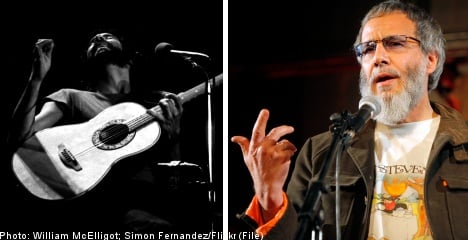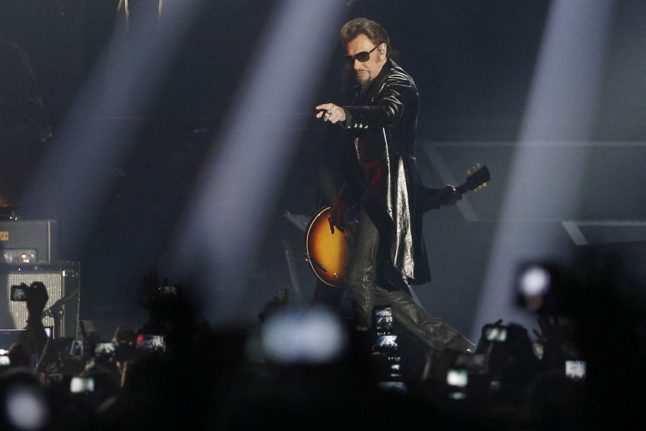At first glance, one may wonder why Cat Stevens, who now prefers to be called just Yusuf, would choose the Swedish capital to launch a comeback more than three decades in the making.
As it turns out, however, Yusuf has had a long relationship with Sweden on account of his mother, who hails from the town of Gävle, located about 150 kilometres north of Stockholm in eastern Sweden.
Yusuf, who was born in London in 1948 and has a Cypriot father, actually lived in Gävle when he was eight years old, and attended a local school for six months.
This experience, he says, prepared him for his future fame.
“It was the first time I realized I was going to be a star,” he explained to talk show host Fredrik Skavlan on Sveriges Television (SVT) in April.
“Everybody was staring at me. I had these brown eyes and at that time everybody had blue eyes, so I had my own little playground and got to choose my friends.”
It wasn’t long until his predictions came to fruition.
By the age of 18 he had tasted his first success in London, both as a singer and a songwriter for other artists.
Songs such as ‘Matthew and Son’ and ‘I Love My Dog’ gained attention internationally, and within a year he was on tour with Jimi Hendrix, arguing over which of them would close the sets each night.
But the ‘Live Fast, Die Young’ life on the road took its toll, and Stevens became hospitalised with tuberculosis in 1969.
The year-long recuperation was the catalyst in transforming Stevens for the first of many times. He covered up the mirrors, picked up a pen and a guitar, and focused on self discovery. His resulting music was deeply introspective and hugely popular.
Stevens emerged from the hospital and into the 1970s with a flowing beard and good health.
Over the next three years he took the world by storm with the multi-platinum albums ‘Tea for the Tillerman’, ‘Teaser and the Firecat’, and ‘Catch a Bull at Four’.
These included such classic songs as ‘Peace Train’, ‘Morning Has Broken’, and ‘Father and Son’, helping make Stevens into the voice of a generation.
However, unexpected events would once again lead to drastic change for Stevens.
While swimming at Malibu Beach in 1975, he got trapped in a strong current and began fearing for his life.
Desperate, he made a bargain with God.
“If you save me, I’ll work for you,” he recalls saying to himself.
With these words a wave carried him safely to shore and the deal was done – but a few surprising details were yet to be clarified.
Soon after, Stevens received a gift of the Book of Koran. Despite ‘never being interested in Islam before’, something clicked, and he embraced the religion wholeheartedly, turning his back on the music industry entirely.
In his 2004 DVD Majikat, Yusuf claims that he found in the book “a world of explanations which lay beyond the veil of Western imaginings”.
He changed his name from Cat Stevens to Yusuf Islam in 1978 and auctioned off all his musical instruments.
Fans were confused, even angry, but Yusuf had found his calling and wasn’t looking back.
“Everything came together. I recognised so many things which were part of everything I learnt as a Christian,” he told Skavlan.
He then claimed that his Swedish upbringing allowed him to be so open minded about discovering a new religion.
“I had that Swedish part of me, which said, ja, let’s have a look, let’s get out there and see. Vikings were very brave people… they went everywhere, picked up so many things and brought them back. I had that as well. I went in there and looked. I recognised [Islam], it’s not foreign. Jesus is here, Moses is here, Abraham is here, God’s here,” he said.
However, the new religion and the subsequent musical influence have divided fans, old and new. He was booed at a Dublin concert in 2009 for playing his latest music, yet the video for the title track from 2000s ‘A is for Allah’ has been viewed more than 11 million times on YouTube.
While Yusuf has shied away from politics or preaching, he admits that the September 11th, 2001 terror attacks in the United States inspired him to get back into music.
“What happened in New York in 2001 was the spark that made me seriously return to music and through it distance myself from terrorism and hate,” he recently told the TT news agency.
“Islam in itself isn’t a threat and many people, including Muslims, forget that the word comes from peace. So what I did directly after that was to sing my song ‘Peace Train’ and continue to spread the message of peace.”
Speaking on Skavlan, Yusuf explained that people in the Muslim world “want the same freedom as we’ve got”.
“If the Middle East had freedom, they may not use it the same way as Europeans, but give them the freedom to do it,” he said.
Yusuf however, is not back on tour to promote religion, rather, to spread the word of peace and freedom.
“Today with the miniature revival of Cat Stevens, I think that being available is important. There was an incredible movement in the 70s which was pointing toward a much more enlightened world,” he said on Majikat.
“My songs captured that and they need to be there for people to wake up to the issues within themselves and perhaps to open that little door which may change their life.”
Yusuf also has a new single called “My People”, written in the wake of the recent political upheaval in Egypt and elsewhere in the region.
“It’s my wish to join with the people’s call for freedom, to lend my voice to others who are fighting for basic rights,” he told TT.
Despite all the controversies, the changes, and the 35 odd years since last time, when Yusuf picked up an acoustic guitar on Skavlan it sounded as if no time had passed at all.
And as an expected sellout crowd gets set to gather in Stockholm’s Hovet arena on Saturday, many are no doubt hoping that the spirit of Cat Stevens and his melancholic melodies will have no trouble re-emerging when Yusuf takes the stage.



 Please whitelist us to continue reading.
Please whitelist us to continue reading.
Member comments